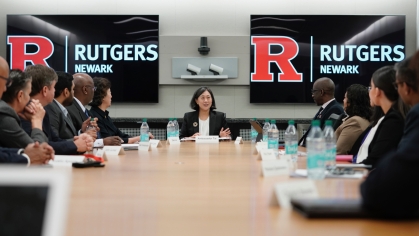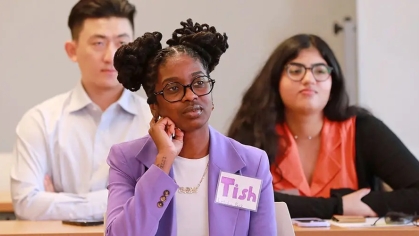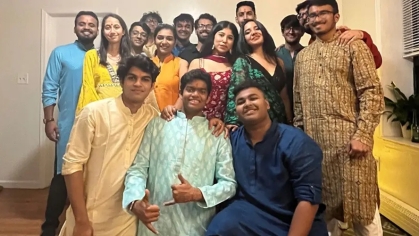Team of Rutgers students are regional finalists in Hult Prize Competition
For several years, Rutgers Business School freshman Eman Elgouz has carried around a passionate interest in forming a business to help educate children in some of the poorest areas of the world. So when she decided to submit a last-minute application to enter the Hult Prizecompetition, it wasn’t difficult for her to be persuasive.
"I already had the idea in place," Elgouz said. "This was a perfect opportunity to put the idea forward and try to do something that can make some type of change.”
In an early morning email during winter break, Elgouz learned that her idea had been selected from nearly 20,000 applications and that she and her two teammates would be going to the competiton’s regional finals March 13 in Boston.
The team includes Elgouz’s classmates Rutgers Business School sophomore Moazzam Ismail and Rutgers University-Newark freshman Madani Sheikh. Elgouz, who is studying finance and accounting and Sheik, an English student, are also Rutgers Honors College students.
The Hult Prize Foundation holds the annual competition to identify and help launch the most compelling social business ideas being proposed by university students. The foundation awards winners $1 million in seed money and asks members of the international business community to serve as mentors to the winning students.
Sheikh said he was "blown away" by the team’s selection as regional finalists and immediately created a to-do list, sought the advice of Rutgers Business School professor Jeffrey Robinson and started meeting on Group Chat. With just weeks to go, they are excited, nervous and determined.
"We’re ready to go as far as we can," Sheikh said.
At the regional finals, the three students will have to present a business plan detailing Elgouz’s idea of creating a for-profit company that opens schools in slums around the world and provides economic development for residents living around them. (The students were reluctant to reveal too many specifics about the business plan before the actual competition.)
"Our idea is innovative," said Ismail, who is a finance student at Rutgers Business School. "That’s the main thing we have going for us."
Professor Robinson, whose expertise is social enterpreneurship, described the team's plan as "thoughtful and sustainable."
"They’re designing a solution that makes a significant intervention on the issue of education in poverty," Robinson said. "They’re trying to break one of the poverty traps."
Outside the U.S., a public education is not guaranteed, making it difficult for children to have a better economic situation than their parents or to escape a generations-long cycle of poverty, Robinson said. "Their idea could move families out of poverty," he said of the students. "That’s what I love about what they’re doing.”
The winner of the regional competition in Boston will spend a month working with representatives of the Clinton Foundation to hone a business plan before going on to participate in the finals in September. Six finalists will compete for the $1 million at a competition in New York City.
"There are always a lot of applicants in this competition," Robinson said. "To have a team of Rutgers students in the regional finals is an awesome accomplishment."
Elgouz said she is overjoyed at the chance to participate in the regional finals. "It will be an amazing opportunity to meet some of the brightest minds in the world,” she said.


